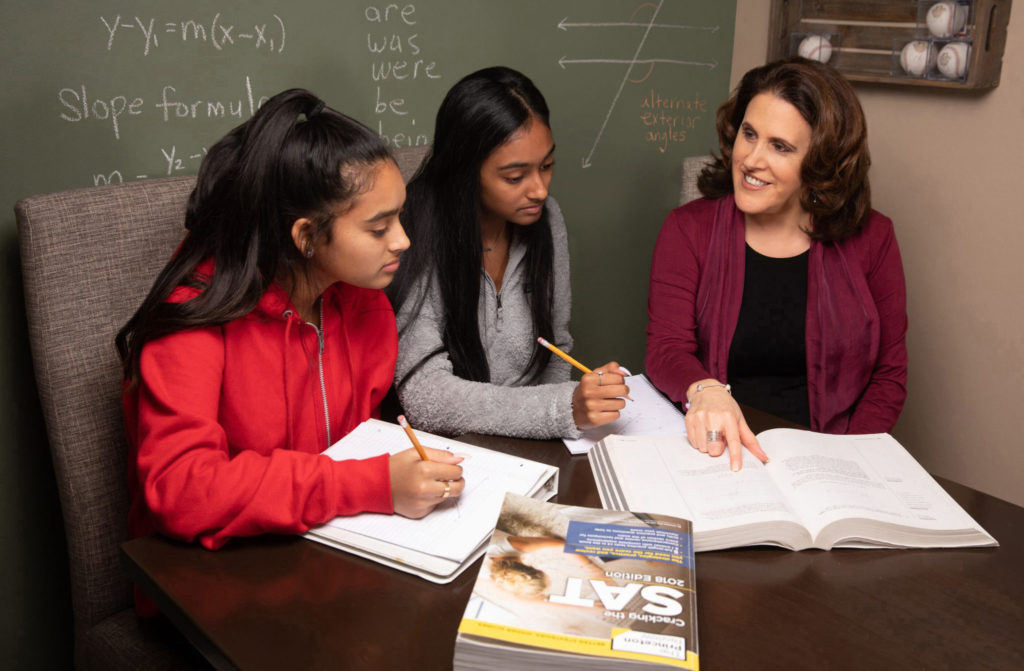
No two students are the same, so why does it seem like so many test prep companies have a one-size-fits-all approach? My SAT program and philosophy are based on the principle that every student should have access to a carefully customized program that addresses his or her learning style.
My proven, personalized approach is as unique as each student. With analysis of your student’s academic strengths and weaknesses, I tailor coursework, customize my test preparation program and motivate my students. I strive to break down the daunting SAT journey into a step-by-step process that will put your mind at ease.
Course content
During my SAT sessions, students learn:
- Test-taking strategies for the reading comprehension, writing/language and math portions of the exam
- Essay writing skills specific to the SAT (reading and analyzing)
- Techniques for avoiding common pitfalls
- Time management skills
- Methods for studying “multiple meaning” vocabulary words for the new SAT (e.g., how to identify and figure out the meaning of words in context)
How important is the SAT?
College admissions take many factors into consideration when evaluating an applicant.
- High school courses and grades (60%)
- SAT and SAT Subject Test scores (30%)
- Essays, recommendations and extracurricular activities (10%)
Since grades are weighted heavier than standardized tests in the application process, I encourage students to find a healthy balance between preparing for the SAT while maintaining their academic excellence in their core subjects.
My comprehensive SAT preparation program combines techniques from the Princeton Review, Kaplan, and IVY West review preparation courses.
Initial individual assessment
Your child will take a full-length practice exam to generate a baseline score. I will analyze and break down your child’s diagnostic test into basic components, allowing me to quickly identify his or her target areas. Based on your child’s performance on this initial practice test, I will customize a program that will fill in content gaps and address your child’s specific academic needs.
The “optional” rhetorical analysis SAT essay
The essay used to be a required part of the SAT, but not all colleges found this score useful. One of the March 2016 revisions to the SAT is that the essay is now “optional” and scored separately. The problem is that some colleges require the essay, while others do not. For this reason, I encourage all SAT students to keep their options open and prepare for this portion of the exam.
I guide each student through the process of developing a cohesive five-paragraph essay with a strong thesis statement and introduction, supporting paragraphs, transitions and a solid conclusion. I demonstrate how to write a logical, well-constructed analysis of the author’s speech or argument.
I help the student to:
- Comprehend the source text
- Understand the central ideas, details and their interrelationship
- Incorporate textual evidence (quotations and concepts)
- Consider the central idea or SOAPS (speaker, occasion, audience, purpose and subject)
- Understand Aristotle’s Rhetorical Triangle (ethos, pathos and logos)
- Develop effective organization and progression of ideas
- Use varied sentence structure
- Integrate clear transitions
- Show command of the conventions of standard written English
SAT math
I provide tutoring for the math portion of the SAT that reflects the current content and best strategies on the test. In addition to covering question interpretation and guessing strategy, I review fundamental algebra, geometry and combinatoric concepts. I also recommend techniques designed to hone time-management skills.
It is essential that high-school students, even those who are comfortable with higher level math, learn strategies specific to the SAT. Many SAT math problems should not be approached and solved in the same way as in the classroom. “Working backwards,” “ballparking” and “plugging in answer choices” can shave off valuable minutes in any given math section.

After working with Lindsay, I raised my SAT score 290 points! In addition to teaching the curriculum needed to pass the SAT, she also helped me with time management, allowing me to complete more of the SAT in the allotted time, which in turn positively affected my score. The best part was that all of the strategies she taught me to use for the SAT were things I could apply to general coursework and AP tests later on in my high school career, as well as in college.
SAT Subject Tests preparation (SAT IIs)
SAT Subject Tests are a less talked about but important part of the college application process. Many colleges require at least one SAT Subject Test as part of their applications. Although the University of California system no longer requires these exams, it recommends them for students seeking to distinguish themselves in competitive fields.
The SAT Subject Tests demonstrate a student’s proficiency in specific academic subject areas and use a standardized test format similar to that of the SAT.
Tests are offered in the subject areas of history/social science, English literature, math, laboratory science and a language other than English. These tests are significantly more difficult than the regular SAT and require a very different skill set. Students typically take these exams in the spring of their sophomore and junior years or in the fall of senior year.
For these tests, I initiate a discussion with each student to determine his or her readiness for the exams and the ideal time to take them. The best way for a student to see which SAT Subject Tests are right for him or her is to take practice tests and score them. I can guide each student through this diagnostic process.
My SAT Subject Tests preparation program is a more focused review of subject-specific content; I follow the same strategies that I employ with SAT preparation.
My goal for SAT and SAT Subject Tests tutoring is for a student to achieve a strong test score and to walk away from our sessions with a set of skills that is transferable to the classroom.
